The digital world is rapidly evolving, and with this growth comes the need for heightened security measures. Blockchains technology, combined with artificial intelligence (AI), is shaping the future of digital transformation, particularly in the realm of blockchains security bringing success in digital marketing.
Here, we will delve into how blockchains security is evolving with AI integration, the role of decentralization, cryptography, and how businesses can benefit from AI-driven security solutions to protect their digital assets.
Understanding Blockchains Technology: The Backbone of Digital Security
Blockchains technology has revolutionized the way data is stored, managed, and protected, providing a secure, transparent, and decentralized system.
The Role of Blockchain Security in the Digital Age
Blockchains security encompasses the protective measures and techniques used to safeguard the integrity, confidentiality, and availability of data stored on a blockchain. Below are the key aspects of blockchains security:
1. Cryptography
- Data Encryption: Blockchains use advanced encryption techniques to secure data. Each transaction is encrypted before being added to the blockchain, ensuring that only authorized parties can access and decrypt the information.
2. Consensus Mechanisms
- Proof of Work (PoW): This is a consensus algorithm that requires participants, called miners, to solve complex mathematical puzzles to validate transactions. This mechanism helps prevent fraudulent transactions and secures the blockchain.
3. Decentralization
- Distributed Ledger: One of the key features of blockchain is its decentralized nature. Unlike traditional centralized systems, blockchains data is stored across a network of nodes. This eliminates a single point of failure, making the system much more resilient to attacks.
4. Smart Contracts and Their Security
- Automating Transactions: Smart contracts are self-executing contracts with the terms directly written into code. These contracts automatically execute once predefined conditions are met, reducing the potential for human error or manipulation.
Enhancing Blockchain Security with AI
While blockchains offer inherent security features, the complexity of today’s cyber threats means that additional layers of protection are necessary. Below are ways AI contributes to enhancing blockchain security:

1. AI-Driven Threat Detection
- Behavioral Analysis: AI algorithms can monitor blockchain networks for unusual behavior or anomalies that may indicate a potential attack. By analyzing patterns in data, AI can identify potential threats before they cause harm.
2. Predictive Analytics
- Threat Prediction: By analyzing historical data and trends, AI can predict future security risks and vulnerabilities. This allows blockchain networks to take proactive measures to mitigate threats before they occur.
3. Enhancing Smart Contract Security with AI
- Automated Auditing: AI can be used to audit smart contracts, identifying vulnerabilities in the code before it is deployed. By using machine learning models, AI can analyze the logic of smart contracts to ensure that they are secure and function as intended.
The Future of Blockchain Security
As blockchains technology continues to evolve, its security will only become more critical. Blockchains ability to provide secure and transparent transactions has the potential to transform industries, but to realize its full potential, it must remain resilient against emerging cyber threats.
AI in Blockchain: Enhancing Security and Efficiency
Artificial intelligence (AI) has become a game-changer in enhancing the security and efficiency of blockchain networks. By harnessing the power of AI, blockchain systems can better protect against threats, improve decision-making, and streamline processes.
Key Benefits of AI in Blockchain Security
AI brings several critical advantages to the table when combined with blockchains technology. Here are some of the most significant benefits:
1. Faster Detection of Fraud
- AI-powered monitoring: AI systems can continuously monitor blockchain transactions, looking for suspicious behavior or fraudulent activities.
2. Predictive Analytics
- Data-driven predictions: AI uses historical blockchain data to forecast potential security threats.
3. Automated Threat Response
- Real-time action: AI systems can take immediate action to address threats as soon as they are detected, automating many aspects of blockchain security.
4. Enhanced Cryptographic Security
- Strengthening encryption: Cryptography is the foundation of blockchain security, ensuring that data is encrypted and protected. AI can improve existing encryption methods by identifying and addressing weaknesses in cryptographic techniques.
How AI Algorithms Work in Blockchain Security
AI algorithms, including machine learning (ML) and deep learning (DL) models, are designed to evolve over time, continuously learning from data and improving their predictive accuracy.
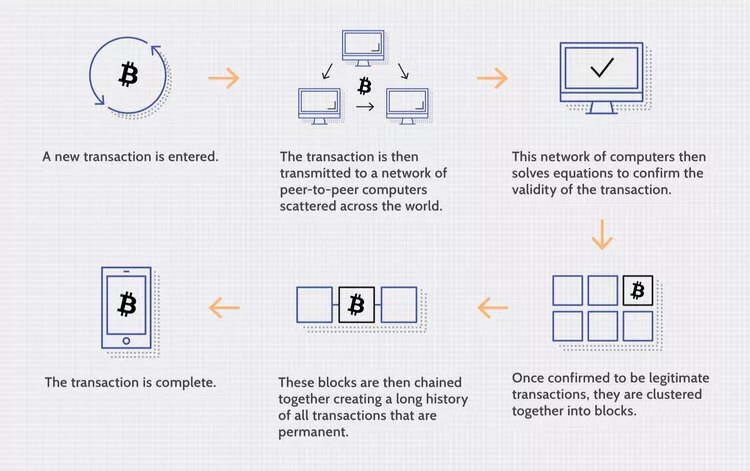
1. Anomaly Detection
- Spotting irregularities: AI algorithms are capable of identifying unusual patterns or behaviors within blockchain transactions, such as unexpected access attempts or alterations to data.
2. Risk Assessment
- Identifying weak points: AI can analyze the entire blockchain network to pinpoint potential vulnerabilities or security gaps.
- Providing corrective measures: After assessing the network’s risk profile, AI suggests actionable measures to strengthen security, ensuring that the blockchain system remains robust against future threats.
3. Fraud Prevention
- Comparing transactions: AI models can compare incoming blockchains transactions against known fraud patterns, helping to identify and prevent fraudulent activities.
- Pattern recognition: With machine learning, AI algorithms can continuously improve their ability to detect fraud by learning from past transactions and recognizing new fraud patterns that may emerge.
AI-Driven Security: The Future of Blockchain Protection
AI-driven security is revolutionizing blockchain protection, marking a significant step forward in securing decentralized networks. With the continuous advancements in AI, its potential to enhance blockchains security has become virtually limitless.
The Role of AI in Digital Transformation
Digital transformation refers to the integration of digital technologies into every aspect of business operations. This profound shift is reshaping how businesses operate and interact with customers, pushing organizations to adopt more efficient, secure, and transparent systems.
How AI-Driven Security Supports Digital Transformation
- Automated Security Protocols:
AI can automate a range of security tasks, such as monitoring blockchains transactions, identifying anomalies, and verifying identities, reducing the risk of human error and increasing operational efficiency.
- Enhanced Customer Trust:
As businesses implement AI-powered blockchain systems, they can offer their customers heightened security and transparency which builds credibility with customers, ultimately resulting in greater AI-driven audience engagement. Blockchain’s immutable nature, paired with AI’s advanced security features, assures customers that their data is well protected.
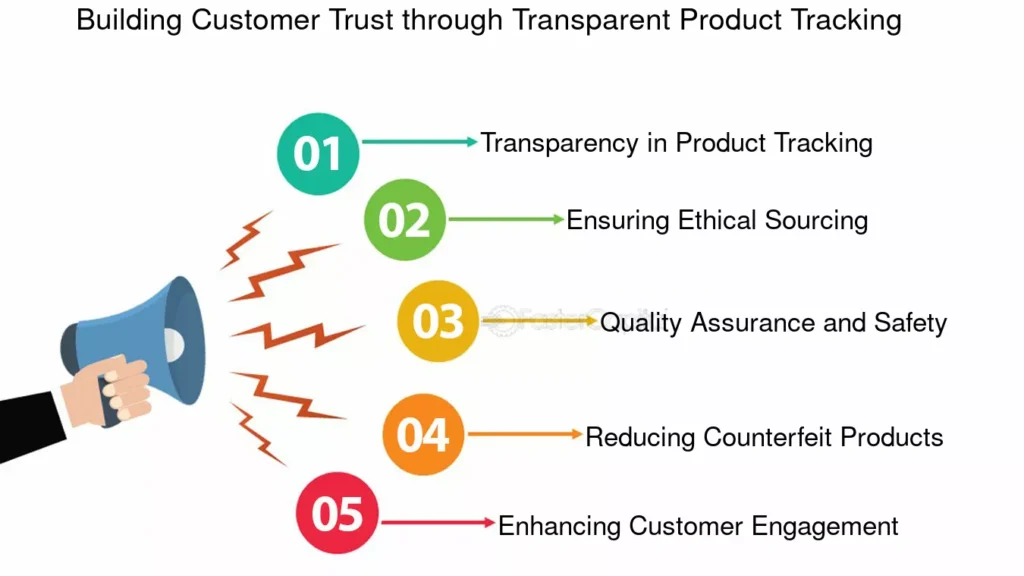
- Scalability:
AI can manage and secure large volumes of blockchain transactions, making it possible for networks to scale without compromising on security or performance.
Benefits of AI-Driven Blockchain Security for Businesses
The integration of AI with blockchains technology provides a range of significant advantages for businesses, improving both security and operational efficiency and providing accelerated business trajectory. Here are some of the key benefits:
1. Cost Efficiency
- Reduced Operational Costs:
AI-driven security minimizes the need for manual interventions by automating security processes. This reduces labor costs, the need for extensive human oversight, and the risk of human error.
2. Reduced Downtime
- Proactive Threat Prevention:
One of the most valuable benefits of AI-driven security is its ability to identify and prevent cyberattacks before they happen. By continuously monitoring blockchains transactions and recognizing potential vulnerabilities, AI ensures that threats are addressed before they cause significant disruptions.
3. Regulatory Compliance
- Ensuring Adherence to Standards:
Blockchain networks are subject to a range of regulatory standards, depending on the industry and region. AI can help businesses stay compliant by ensuring that blockchains transactions and security protocols meet the required industry regulations.
AI-Powered Blockchain Security: A Competitive Advantage
Incorporating AI into blockchain security is not only a way to enhance protection but also a competitive advantage for businesses. Organizations that prioritize AI-driven security in their blockchain systems can differentiate themselves in a crowded marketplace by offering superior security, efficiency, and transparency.
The Integration of Smart Contracts and AI for Blockchain Security
Smart contracts are widely recognized as one of the most innovative aspects of blockchains technology. These self-executing contracts, with the terms of the agreement directly written into lines of code, have transformed the way businesses operate proving the beneficiaries of AI-powered smart contract integration.
Smart Contracts and Blockchain Security
Blockchain security revolves around protecting the integrity and confidentiality of data and transactions within a decentralized network. Smart contracts, being an integral part of blockchain networks, must be properly secured to ensure the overall safety of the blockchain system.
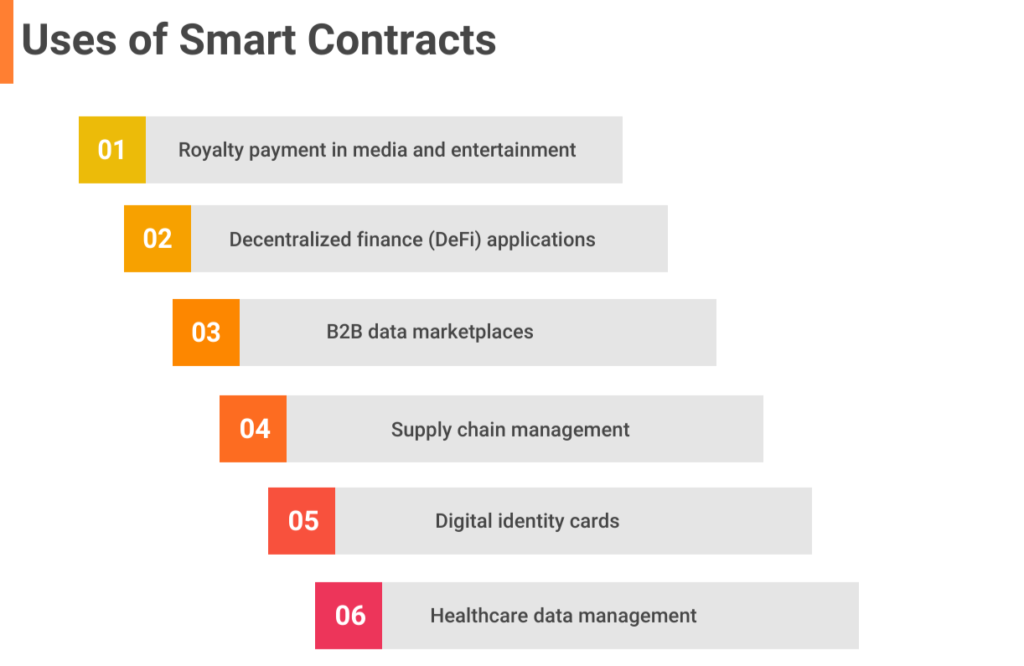
How AI Enhances the Security of Smart Contracts
1. Automated Auditing
- AI-Driven Code Review:
AI algorithms can automatically audit smart contract code for vulnerabilities before the contract is deployed on the blockchains. This automated auditing process significantly reduces the risk of human error, which is often a major contributor to security breaches in manually reviewed contracts.
- Continuous Monitoring:
Once deployed, smart contracts operate autonomously, but AI can continuously monitor the code to ensure its performance. By scanning for potential changes in the network environment or new vulnerabilities, AI helps ensure that the smart contract remains secure over time.
2. Improved Execution
- Real-Time Monitoring:
AI can monitor the execution of smart contracts in real-time, ensuring that the contract terms are being executed as intended. This includes verifying that the conditions and triggers are met properly and that no unauthorized actions are taking place.
- Behavioral Analysis:
AI can track the behavior of smart contracts and their interactions with other smart contracts and blockchain participants. This can help detect suspicious patterns or anomalies, such as an unexpected interaction between contracts or the unauthorized alteration of terms.
3. Error Detection
- Identifying Coding Mistakes:
Like any piece of software, smart contracts are prone to bugs or coding errors that can lead to unintended consequences. AI can automatically detect coding mistakes within the smart contract using its automated detectors and flag them for correction before the contract is activated on the blockchain.
- Providing Solutions:
Once errors are detected, AI can suggest potential solutions or fixes, assisting developers in resolving issues before they can be exploited. This reduces the time it takes to correct errors and ensures that the smart contract is optimized for secure execution.
The Impact of AI-Enhanced Smart Contracts on Blockchain Security
By integrating AI into the development, auditing, execution, and monitoring of smart contracts, businesses can enhance the security and reliability of their blockchains systems. AI helps ensure that smart contracts operate without errors, vulnerabilities, or malicious interference, contributing to a more secure blockchain network overall.
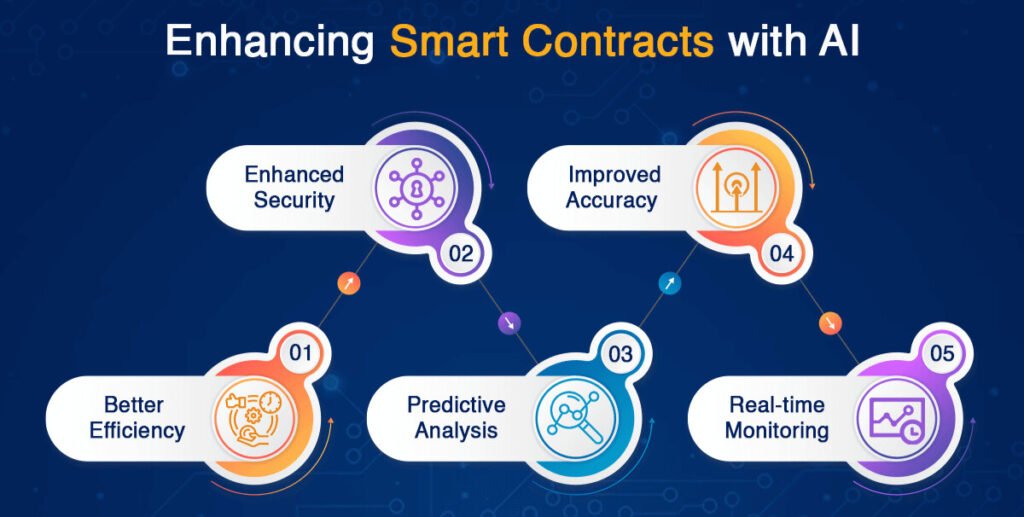
Key Benefits of AI-Enhanced Smart Contracts:
- Reduced Risk of Vulnerabilities: AI-driven audits and real-time monitoring ensure that smart contracts are free from flaws and function as intended, minimizing the risk of security breaches.
- Increased Efficiency: Automation of auditing and monitoring processes accelerates the deployment and execution of smart contracts, enabling businesses to operate more efficiently.
Decentralization and Blockchain Security: How AI Enhances Privacy
Decentralization is the foundational principle of blockchain technology. By ensuring that no single entity has control over the entire network, decentralization makes blockchain inherently more secure and less vulnerable to attacks, offering greater resilience in the face of potential threats.
How AI Enhances Decentralized Blockchain Security
1. Improving Consensus Mechanisms
- Optimizing Decision-Making:
Consensus mechanisms are at the heart of blockchain security, as they ensure that all nodes in the network agree on the validity of transactions. Traditional consensus algorithms such as Proof of Work (PoW) and Proof of Stake (PoS) can be resource-intensive and vulnerable to inefficiencies or attacks.
2. Distributed Denial of Service (DDoS) Attack Prevention
- Detecting Malicious Activity:
Distributed Denial of Service (DDoS) attacks are a common threat to decentralized networks. These attacks involve an overwhelmed network with a large volume of traffic, causing disruptions or crashes. While decentralized systems are designed to resist many types of attacks, they are still vulnerable to DDoS attempts.
3. Privacy Preservation
- Enhanced Data Encryption:
Privacy is a critical concern in any decentralized blockchain network. Even though blockchains public ledger ensures transparency, it also means that transaction data is visible to all participants in the network. This transparency can be a double-edged sword when it comes to protecting sensitive information.
The Benefits of AI in Enhancing Blockchain Privacy and Security
The integration of AI into decentralized blockchain systems not only enhances security but also provides numerous benefits for businesses and users.
Key Benefits Include:
- Proactive Threat Detection: AI’s ability to analyze large volumes of data in real-time enables the detection of potential threats before they escalate. By identifying unusual patterns or activities, AI can help mitigate risks and improve network security.
- Reduced Attack Surface: AI enhances blockchain security by continuously monitoring the network and implementing countermeasures. As a result, it reduces the attack surface, making it more difficult for malicious actors to exploit vulnerabilities.
Blockchain Security Challenges and How AI Can Address Them
Blockchain technology is widely recognized for its strong security features, such as decentralization, immutability, and transparency. However, as with any complex system, blockchains are not immune to security challenges.
1. 51% Attacks
A 51% attack occurs when a malicious actor or group of actors gains control of more than half of a blockchain network’s computational power, allowing them to cause the manipulation of the blockchain by reversing or altering transactions. In this scenario, attackers could double spend tokens or prevent new transactions from being confirmed, leading to significant disruptions in the network.
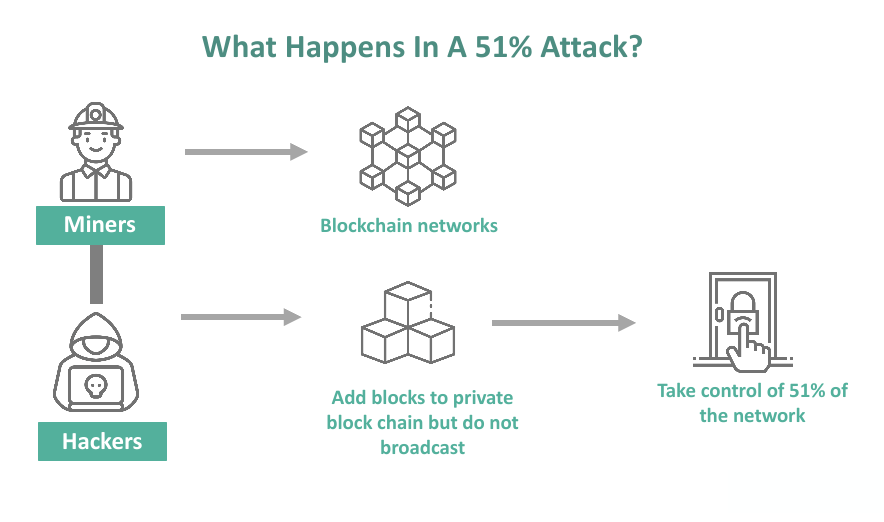
How AI Can Help:
- Real-Time Monitoring and Anomaly Detection: AI can monitor network activity 24/7 and use machine learning algorithms to detect irregular patterns that could indicate a potential 51% attack. By analyzing historical and real-time data, AI systems can spot unusual spikes in computational power or mining activity, which may signify an ongoing attack.
2. Double Spending
Double spending is a potential security risk in blockchains networks, where a user attempts to spend the same cryptocurrency more than once. This can happen when a malicious actor exploits the time lag between transaction confirmation or tries to trick the network into accepting two conflicting transactions.
How AI Can Help:
- Transaction Monitoring: AI can help prevent double spending by continuously monitoring blockchain transactions in real-time. Machine learning algorithms can quickly analyze transaction patterns and detect any attempt to reuse the same funds in multiple transactions, alerting the network to the fraudulent activity.
3. Scalability Issues
Scalability is one of the most significant challenges facing blockchains networks today. As the number of users and transactions on a blockchain grows, the network can become congested, leading to slower processing times, increased transaction costs, and reduced efficiency. This can create vulnerabilities, as cybercriminals may exploit these delays to launch attacks or conduct fraudulent activities.
How AI Can Help:
- Optimizing Transaction Throughput: AI can optimize blockchains scalability by dynamically adjusting transaction processing based on the current load on the network. Using predictive models, AI can anticipate peak periods and scale resources accordingly, ensuring that the network operates efficiently without compromising security.
FAQs
1. How does AI enhance blockchain security?
AI enhances blockchain security by detecting vulnerabilities, automating threat responses, and improving encryption techniques.
2. What is the role of AI in preventing cyberattacks on blockchains?
AI monitors transactions in real-time to identify and mitigate potential cyberattacks before they occur.
3. How does AI improve the scalability of blockchain networks?
AI optimizes transaction processing, adjusts consensus mechanisms, and helps manage network loads for better scalability.
4. Can AI predict future blockchain security threats?
Yes, AI uses predictive analytics to analyze historical data and anticipate potential security threats in blockchain networks.
5. What is the impact of AI on blockchains future security?
AI’s continuous advancements will provide more efficient, scalable, and resilient security solutions for blockchain systems.
Conclusion:
The integration of AI in blockchain technology offers a transformative solution to the growing security challenges in today’s digital ecosystems. By incorporating AI-driven security systems, businesses can not only fortify their blockchain networks but also streamline data protection and enhance operational efficiency.
Incorporating AI into blockchain security is more than just a technological trend—it has become a necessity for businesses aiming to stay ahead of the evolving cyber threats. With AI’s ability to quickly analyze vast amounts of data, it ensures that blockchain networks remain secure and resilient.
Looking ahead, the future of blockchain security is closely intertwined with the continuous evolution of AI. By embracing AI, businesses can future-proof their blockchain infrastructure and build trust in an increasingly interconnected digital world.
